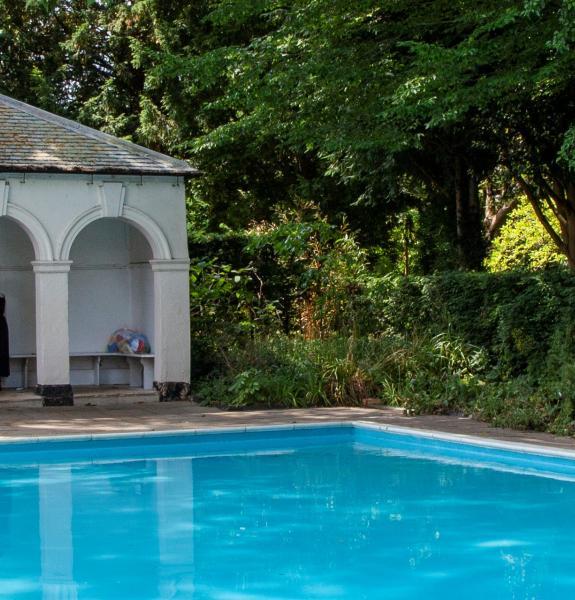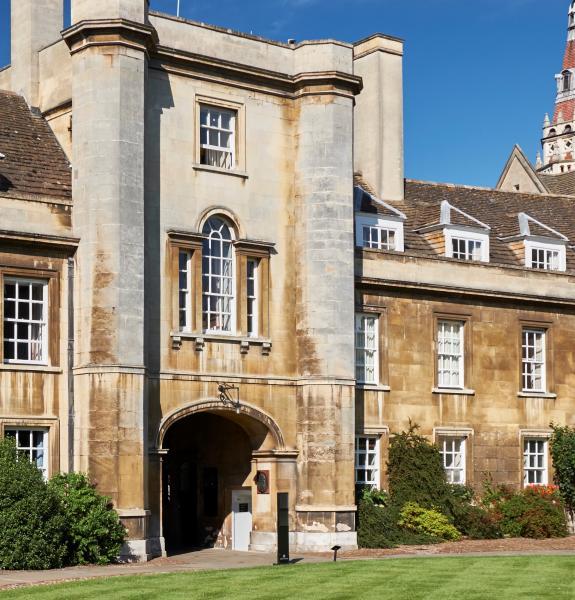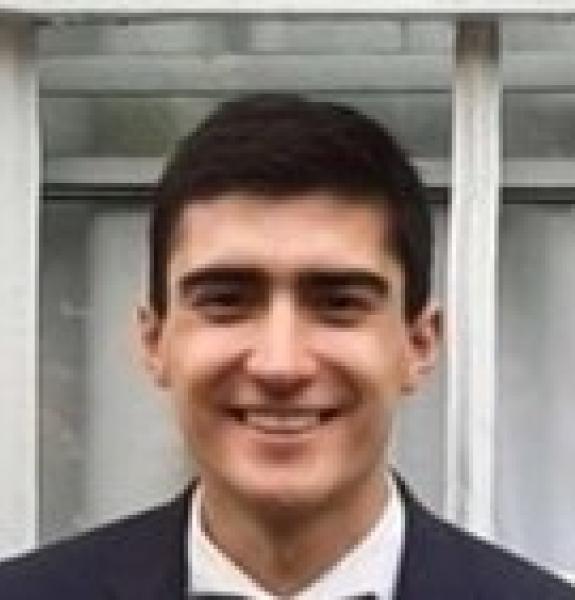Nina wrote this at the end of her first year studying Philosophy at Christ's College, Cambridge. She is from Aarhus, Denmark, where she studied for the Danish Studentereksamen. Nina is our current Oscar Lewisohn Award holder (this is one of the Christ's International Awards).
What made you apply to Christ's?
Christ’s has extensive and informative international outreach programmes, and it was possible for me to attend webinars with open question sessions, virtual tours, etc. It introduced me not only to the college, but to the university, the financial and academic requirements, and the English system in general.

Also, to be completely honest, the spring-time pictures of First Court with all the wisteria on the front page of the college’s website when I was applying weighed disproportionally heavy in my decision to apply here!
Christ's might not have the most impressive grounds if you compare it with the largest Colleges (e.g. St John's, Trinity) - yet it has a subtle beauty and welcomeness. Well-gardened flower beds are strewn across the college, and the Fellow’s Garden with all its plants and birds - and of course, the swimming pool - is definitely my favourite place in college. It has a privacy about it, especially in the mornings and afternoons and during exam term. It really contributes to making Christ's feel much less like a historical tourist site and more like a place to come home to after a long day of lectures and reading.
What impact did Brexit have for you?
Brexit impacted my application a lot! I always felt that Christ’s supported me as much as they could, however. I am now classed as 'international' for fee status, so Brexit more than doubled my tuition fees (compared to pre-Brexit EU-costs) and also added the college fee, which international students pay. Financially, I would have been unable to begin my studies without the university-wide Cambridge, Commonwealth, European and International Trusts Award, in combination with the Christ's International Award and a college fee waiver. I really appreciated all the help, and it gave me a strong impression that I was going to the right place – an intuition that has been confirmed!
There were also issues with my visa application, so I arrived a late in my first term. But although college couldn’t directly help with it, they kept in contact throughout, reassured me it would work out, and took any measures they could so I wouldn’t feel behind.
What was it like to start studying in a new country?

I started at uni right after finishing my exams in the general gymnasium (STX, for those who are familiar with the system). In Denmark, it’s not that common to go straight to university after school, so I was a bit nervous about whether I’d be ready for it. But there was no need to worry: living in college means you’re not completely on your own – there’s pastoral support, friends close by at all times, cleaning, and you know where to go for food!
This definitely sets university life at Cambridge apart from those without a collegiate system, like the ones I’m familiar with. I’d say, it does leave you less independent than you might expect when moving away from home for the first time. But it was just what I needed when beginning my studies in a foreign country.
As I applied during the pandemic, I didn’t have a chance to visit Cambridge - neither before applying nor at my interviews, which were online. In many ways, I was surprised when actually arriving, not least because of the contrast between the protected life inside college and the outside city, and in terms of what awaited in college itself. This year, I have been living in New Court in the Typewriter building. It gets a bit chilly in the winter, but I’ve shared a staircase with a bunch of lovely people doing different subjects. Just catching up in the kitchen, talking about essays, friends, love, student discounts, and the best libraries and cafés whilst trying to cook something that looks like a dish on an induction hob (the kind in all kitchens at Christ's!), is one of the most wholesome things about college life.
What attracted you to your course?
I’m in love with philosophy, so that’s easy: the idea of meeting like-minded people, the Faculty’s level of academic excellence, and it’s history of harbouring frankly outstanding philosophers.
How did you find the application process?

Coming from a different system completely, I found the application process very complicated. It wasn’t until I became acquainted with all the details of the process that I realised that a lot of the applicants I’d be competing against had been brought up in this system, and I feared that it gave them some advantage. Even just writing a personal statement can be difficult, for example, when you don’t know the genre or what, precisely, is expected of you. I personally found the UCAS online webinars helpful, as well as the reading on the UCAS, Christ’s, and University websites.
My best advice here is to suspend yourself from it as much as you can. Write the best of what you’ve done, what you can do, what you find interesting about philosophy. Show, rather than tell, through your achievements and passion, that you are the right candidate. Have someone read it through both with and without you. Think about it, take a break for a couple of days, and get back to it. It’s a very open assignment, so it’s likely to reflect a lot of you; but it can also be a helpful exercise in narrowing in on precisely what you like about philosophy and why you’re applying at Cambridge – familiarity with such consideration can form a helpful and strong personal backbone for your continued application process, because it can be really exhausting.
Furthermore, I was actually sick and in hospital when the admissions assessment for philosophy (essay writing and logic test) was due. Luckily, the college – helpful as ever - managed to re-arrange an assessment time for me and always readily answered my queries. The uptake, I think, is this: keep your focus and energy directed on shaping your own application in the best way you can.
What was your interview like?
The interviews were what worried me the most. As prep, I basically reread all the literature I’d listed in my personal statement. I thought I’d be kind of examined in it. Well, I was not. In fact, they didn’t ask about it (but be mindful that each interview is different!). Still, the type of questions was not entirely unfamiliar, as I’d previously consulted the preparatory webpages on the university website. I handled the questions best as I could. In practice, this meant that I also expressed my doubts about several of my answers, and explored multiple possible answers that sprang to my mind.

To complicate things, it also all happened online, and I’m not an especially digitally gifted person. At one point, my interviewers said they couldn’t hear me that well, and I thought the sky was about to fall down. Somehow, I managed to get a pair of headphones set up and everything was fine (of course, I was the only one stressing). For issues which are irrelevant to the assessment of your qualities as a candidate for studying your subject, there’s generally no reason to worry – it’ll get sorted even if it’s a bit complicated.
I was not particularly confident about my performance afterwards, and I worried that I didn’t stand out given the conformity I imagined characterised the online format of the candidate interviews. My ultimate advice is: don’t let your own intuitions about how it went inform your expectations all too heavily. The verdict will fall as it falls. And the interviewers are most likely seeing things you didn’t even know you were showing.
What surprised you about starting your course?
 I started reading philosophy some years before applying to Cambridge. But what really surprised me about starting doing philosophy here was the methodology, the rigour, and precision with which the subject is conducted at Cambridge. One of this years’ best academic experiences has been moving from being in awe of the fact that some person could think up a particular philosophical thesis, to a position where I’m capable of - I should hope - sincerely understanding and criticising it! My excellent supervisors have also allowed and helped me to formulate my own ideas, informed by both merits and objectionable features of other thinkers’ theories.
I started reading philosophy some years before applying to Cambridge. But what really surprised me about starting doing philosophy here was the methodology, the rigour, and precision with which the subject is conducted at Cambridge. One of this years’ best academic experiences has been moving from being in awe of the fact that some person could think up a particular philosophical thesis, to a position where I’m capable of - I should hope - sincerely understanding and criticising it! My excellent supervisors have also allowed and helped me to formulate my own ideas, informed by both merits and objectionable features of other thinkers’ theories.
Back when I was reading on my own, I’d sort of free-style and so phenomenology, world philosophy, logic, French existentialism, and philosophy of language on a par. The syllabus at Cambridge quite selectively favours ‘analytic philosophy’. For example, logic and formal logic plays quite a big role, and philosophy where well-formulated, narrow theses are rigorously perused, is generally favoured. I happened to love the Meaning and Formal Methods papers a lot, which are all closely engaged with and make use of logical formalism and debates in the philosophical logic, etc., and I will be doing the History of Analytic Philosophy paper next year. I think, although you can get by alright despite not having a strong feel for logic, it’s difficult to avoid having to engage with it even in depth if you want to understand a large part of the contemporary and historical debates in focus at Cambridge.
In some sense, it’s a bit unfortunate that Cambridge philosophy is so analytically inclined. But in another, it explains why they are so incredibly good at the kind of philosophy they do here. The selective syllabus has also helped ‘secularise’ my philosophical interests and given me more latitude to realise what and the way I want to read outside my studies. Nonetheless, I am excited about being able to choose my papers in the next part of my degree.
What is the workload like?

I typically do one essay based on a given essay question each week, followed by a supervision (the very small-group teaching offered at Cambridge) discussing the work. There’s a lot of reading, a lot of thinking, a lot of going over your work. And still, there’s always more objections to anticipate, details to work out, and literature you haven’t read. I’ve found the skill-set I’ve had to acquire hasn’t just got to do with understanding what I’m reading, but with getting a good grasp of the way to study. I still find it difficult to navigate between a healthy study-life balance and engaging with my essay questions and readings in a way that, from a point of view of academic integrity, pays proper heed to the complexity of the issues. It’s been invaluable to me to have close friends to discuss my degree with (or life in general!), who take me dancing, and remind me to eat gelato and not sit hunched over a computer all day. Because Cambridge honestly has so much to offer, the very best of which, I think, is the people you get to meet.
What do you do when you're not working?
Next year, I’ll be running the undergraduate philosophy society, the Amoral Sciences Club (which is by the way open for attendance for all); I hope we can do a reading group like we did this year. But Cambridge has other excellent philosophical societies as well. I really think it’s worth attending their events, and I hope I’ll have more time for that next year.
I also joined the Cambridge University Scandinavian Society soon after starting, and I’m now part of the committee. The effortlessness of talking to other Scandi or even Danish students can be a real relief, as I sometimes (especially in the beginning) felt that the British could be a bit reserved (but you just have to get to know them before they warm up to you). I find ScanSoc really homely, and especially like it when we organize events with other international or similar societies: then you get to meet new people together with some you already feel comfortable and familiar with. It’s been a great way for me to meet interesting people outside college and philosophy. And right now I’m really enjoying being part of the organising group who make it happen, not least because I know how important it’s been for me.
What is your favourite memory of this year?

Christ’s college’s May Ball was the greatest social I’ve experienced in Cambridge so far. I found the exams a bit stressful, and I was quite tired when they were all done. So, ending with the Ball was absolutely marvellous: the food was delicious, the thematic decorations amazing, and I literally danced all night. Celebrating being done with my friends could hardly have been done in better style - I’m looking forward to next year’s ball already.
August 2022
Please be aware if you're considering an application that our student writers describe their experiences. Although the majority of the information stays the same, some details may change from year to year. Do read the student profiles in combination with our undergraduate admissions pages for full information.
Back to Student profiles page / Philosophy at Christ's / International students / Students from Denmark / Next: Imogen's Profile




